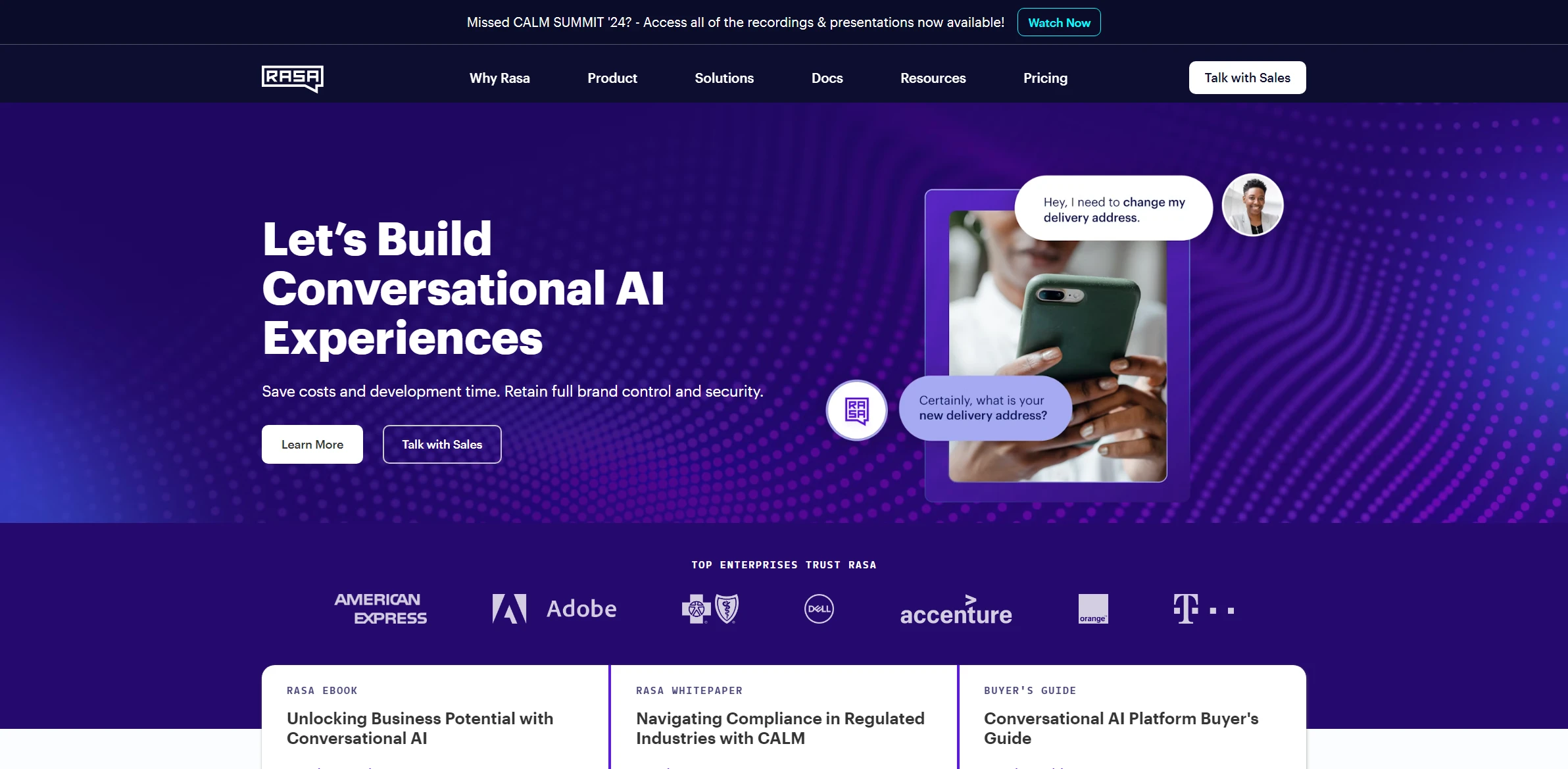Artificial Intelligence Tool Rasa

DESCRIPTION
Rasa is an open-source artificial intelligence framework designed for building conversational agents, such as chatbots and virtual assistants. Unlike many other AI tools that rely heavily on proprietary platforms, Rasa offers developers the flexibility to create highly customizable and scalable conversational interfaces. By leveraging natural language processing (NLP) and machine learning, Rasa allows for the development of complex dialogues that can understand and respond to user intents in a more human-like manner. Its architecture supports both Rasa NLU (Natural Language Understanding) for intent recognition and entity extraction, and Rasa Core for managing dialogue and context, making it a comprehensive solution for conversational AI.
One of the key functionalities of Rasa is its ability to handle contextual conversations effectively. This means that Rasa can remember the context of a conversation, allowing it to provide more relevant responses based on prior interactions. For instance, if a user asks about a product and then inquires about the shipping details, can link these queries together, providing a seamless and coherent experience. This contextual awareness significantly enhances user engagement, making interactions feel more natural and less like a rigid question-and-answer session.
The practical impact of Rasa’s contextual capabilities is evident in various industries, from customer support to e-commerce. Businesses can deploy Rasa-powered chatbots that not only assist customers with inquiries but also guide them through the purchasing process, recommend products based on previous interactions, and even follow up on past conversations. This results in increased customer satisfaction, reduced operational costs, and enhanced brand loyalty, as users are more likely to return to a service that understands their needs and preferences.
Why choose Rasa for your project?
Stands out for its focus on contextual understanding and flexibility, enabling developers to create highly personalized conversational AI. Its open-source nature allows for deep customization, making it ideal for industries like healthcare, where patient interactions require tailored responses. Robust NLU capabilities facilitate intent recognition and entity extraction, ensuring accurate user interactions. Additionally, provides seamless integration with existing systems, enhancing operational efficiency. Practical use cases include customer support chatbots that resolve queries in real time and virtual assistants that guide users through complex processes, ultimately improving user satisfaction and engagement while reducing operational costs.
How to start using Rasa?
- Install by following the official installation instructions in the documentation.
- Create a new project using the command
rasa init. - Define your training data by editing the
nlu.ymlandstories.ymlfiles to include intents, entities, and conversation flows. - Train your model using the command
rasa train. - Run your server and test your chatbot using
rasa shellor by integrating it with a messaging platform.
PROS & CONS
 Offers advanced natural language understanding capabilities, allowing for more accurate intent recognition and entity extraction compared to many similar tools.
Offers advanced natural language understanding capabilities, allowing for more accurate intent recognition and entity extraction compared to many similar tools. Provides a flexible and customizable framework that enables developers to tailor their conversational agents to specific business needs.
Provides a flexible and customizable framework that enables developers to tailor their conversational agents to specific business needs. Supports multi-channel deployment, making it easy to integrate with various messaging platforms and voice assistants seamlessly.
Supports multi-channel deployment, making it easy to integrate with various messaging platforms and voice assistants seamlessly. Features an open-source architecture, allowing for community-driven enhancements and a wealth of shared resources and examples.
Features an open-source architecture, allowing for community-driven enhancements and a wealth of shared resources and examples. Includes built-in tools for dialogue management, enabling the creation of complex conversational flows with minimal effort.
Includes built-in tools for dialogue management, enabling the creation of complex conversational flows with minimal effort. Steeper learning curve compared to some other AI tools, which may require more time and resources to master.
Steeper learning curve compared to some other AI tools, which may require more time and resources to master. Limited built-in integrations with popular messaging platforms, necessitating additional development work.
Limited built-in integrations with popular messaging platforms, necessitating additional development work. Requires a good understanding of machine learning concepts to fine-tune models effectively.
Requires a good understanding of machine learning concepts to fine-tune models effectively. Community support may not be as extensive as that of more widely adopted tools, leading to fewer resources for troubleshooting.
Community support may not be as extensive as that of more widely adopted tools, leading to fewer resources for troubleshooting. Performance can be heavily dependent on the quality of training data, which may be challenging to curate.
Performance can be heavily dependent on the quality of training data, which may be challenging to curate.
USAGE RECOMMENDATIONS
- Familiarize yourself with the documentation to understand its features and capabilities.
- Start with quickstart guide to set up a basic chatbot and gain hands-on experience.
- Utilize this AI interactive learning feature to improve your model’s accuracy by training it with real conversations.
- Implement version control for your projects to manage changes and collaborate with others effectively.
- Leverage NLU capabilities to understand user intents and extract entities from user inputs.
- Integrate with messaging platforms like Slack, Facebook Messenger, or WhatsApp for wider reach.
- Customize your chatbot’s responses by creating a diverse set of training data to handle various user queries.
- Explore Rasa’s custom actions to create dynamic responses and integrate with external APIs or databases.
- Regularly test and evaluate your bot’s performance using this tool testing tools and user feedback.
- Engage with the community through forums and social media to share experiences and learn from others.
- Consider deploying your chatbot using Docker or Kubernetes for scalability and easy management.
- Stay updated with Rasa’s new releases and features to continually enhance your chatbot’s capabilities.
